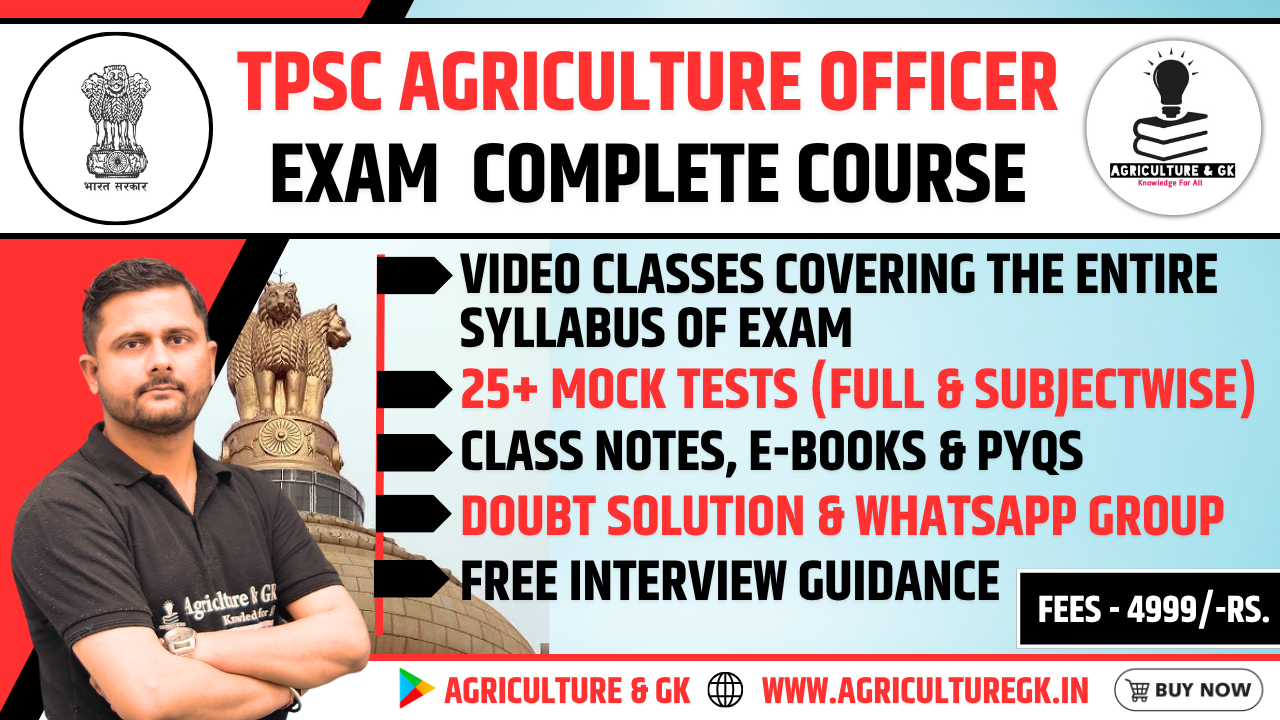TPSC Agriculture Officer Exam Online Coaching / Complete Course
Validity : 12 Months
- For admission call us at 9473826765.
- 300+ Hours Video Lessons covering the entire syllabus of TPSC AO Exam.
- Previous Year Papers & Test Series
- E-Books & Class Notes
- Interview Guidance Programme

₹4,999 ₹20,00076% off
Description
Selection Process
The selection process for TPSC Agriculture Officer Recruitment is through the written test and Personality test or Interview.
TPSC Agriculture Officer Exam Pattern
| Section | Subject | Marks |
| MCQ Part 1 | English and General Knowledge (including Current Affairs) | 30 |
| MCQ Part 2 | Agriculture | 150 |
| Part 3 | Interview | 20 |
| Total | 200 | |
Important Notes:
- The question paper will consist of 180 Multiple Choice Questions (MCQ) each carrying 1 mark.
- Examination will be of 3-hour duration (180 minutes).
- There will be negative marking of 0.25 for each wrong answer.
TPSC Agriculture Officer Syllabus
Check out the detailed syllabus of TPSC Agriculture Officer examination.
MCQ Part 1
English
- Synonyms & Antonyms
- Use of common Phrase & Idioms
- Use of appropriate prepositions and articles
- Comprehension
- Ordering of words in a sentence
- Ordering of sentences
- Spotting of errors
- Use of appropriate and qualifying words etc.
- Parts of speech
- Gender, person & number
- Tense-past, present, future
- Voice change.
General Knowledge (including current affairs)
- Geography of India: Physical, Social & Economic.
- Geography of Tripura: Natural resources with special reference to its soil, forest, water and power.
- History of Tripura: During 1857 to 1949.
- Culture of Tripura: Different Tribes, Languages, Customs, Festivals, Important Historical sites etc.
- Indian Polity and Economy: – Country’s Political system and Constitution of India, Panchayati Raj, Community development, Economic development during Plan periods.
- Science & Technology
- Current affairs of national and international importance
MCQ Part 2 Agriculture
Agriculture in India and Tripura
- Agriculture in India, its importance in national economy.
- History of Indian Agriculture.
- National agricultural setup in India
- Area production and productivity of major crops of Tripura and India.
- Government Agricultural Policies
- Agricultural Education, Research and Extension institutes of National Importance
- Agro- Climatic & Agro-ecological zones of India.
Natural Resource Management
- Soil formation, composition, physical properties.
- Soil fertility and productivity
- Problem soils and their management
- Essential plant nutrients.
- Manures & fertilizers
- Integrated nutrient management (INM)
- Scheduling of irrigation, methods of irrigation
- Water use efficiency
- Quality of irrigation water
- Water stress & management
- Conservation of soil and water
- Watershed and wasteland development
- Cropping systems
- Integrated farming system (IFS)
- Dryland agriculture
- Sustainable agriculture
- Recycling of agricultural waste
- Biodiversity and its conservation
- Application of Remote Sensing & GIS in Agriculture.
Fundamentals of Crop Production
- Factors of crop Production
- Agricultural seasons of India and Tripura
- Recommended Package of practices of different crops with major emphasis in
- System of Rice Intensification (SRI).
- Jhum Cultivation in Tripura
- Organic Agriculture
- Weather, climate, atmosphere. Elements of weather, climatic normals for major crops, weather aberration, weather forecasting, global warming and climate change
- Tilth & tillage
- Crop establishment
- Nano-particles and their applications
- Precision Agriculture.
- Statistical Methods
- Major Weeds of Tripura & Integrated Weed Management (IWM). Commonly used
- herbicides in India and Tripura.
- Farm mechanization and its role in agricultural production and rural employment.
- Basic knowledge of farm implements.
Horticulture
- Definition and branches, importance in human nutrition and national economy and scope
- Plant propagation-methods and propagating structures
- Principles and methods of training and pruning
- Juvenility and flower bud differentiation, unfruitfulness, pollination, pollinizers and pollinators, fertilization and parthenocarpy
- Importance/role of plant bio-regulators in horticulture.
- Irrigation and fertilizer application methods in horticultural crops.
- Rootstocks – importance and role
- Orchard layout and planting systems
- Kitchen gardening, origin, production technology of major vegetable crops.
- Production technology of important flowers
- Production technology of important medicinal plants
- Principles of landscaping, landscape uses of trees, shrubs and climbers.
- Physiological disorders of national importance in important horticultural crops.
- Pre-harvest factors affecting postharvest quality, maturity, ripening and changes occurring during ripening, respiration and factors affecting respiration rate.
- Storage (ZECC, cold storage, CA, MA, and hypobaric)
- Value addition of horticultural crops, principles and methods of packaging, tetrazine films.
- Principles and methods of preservation, Drying/ Dehydration of fruits, osmotic drying, fermentation.
- Application of nanotechnology in post-harvest horticulture.
- Canning — Concepts and Standards, packaging of products.
- Protected cultivation – importance and scope, status of protected cultivation in India and World.
- Types of protected structure, cladding material involved in greenhouse/ poly house, greenhouse design, environment control, artificial lights, Automation, Soil preparation, substrate management, Irrigation and fertigation management.
- Greenhouse cultivation of important horticultural crops
- Off-season production of flowers and vegetables.
- Production Technology of Mushrooms.
Crop Improvement
- Genetics
- Crop Physiology
- Plant Breeding
- Seed and seed technology
Crop Protection
- Plant pathology
- Agricultural Entomology
Social Science
- Principles of farm business management
- Agricultural Extension: Principles and Methods
- Agricultural Marketing & Market Intelligence
How to prepare for the TPSC Agriculture Officer exam?
Preparation is the key to success. So, if you wish to succeed in the Agriculture Officer Exam, then here are a few points that you should definitely keep in mind:
- In order to secure a very good score in the Exam, the students must navigate to the official website of TPSC and get a copy of the official syllabus for the examination. This will give them a clear idea about the examination.
- The students should go through each and every topic mentioned in the syllabus thoroughly. They should also cover all the important topics from their graduation course.
- Revision is very important. You need to revise all the important topics prior to the date of your examination. Also, you should start your preparations at least 3 months from the date of the examination.
Online Course-
To help you grab this great opportunity "Agriculture & GK" has launched TPSC Agriculture Officer Exam Online Coaching. This online course is a complete guidance in the form of crisp and lucid notes to help you crack the Agriculture Officer. Prepared by expert faculties who have diverse experience in the Agriculture sector, this course is a sure shot to your success.
Course teaching mode will be bilingual (Hindi English), This Course is Valid For 12 Months or Till Exam.
There is no refund in any condition. Check all the features before buying if you have any doubt then call our helpline number- 9473826765
Demo Videos







